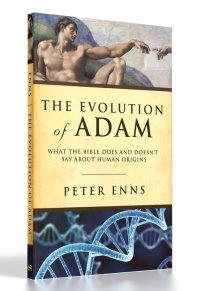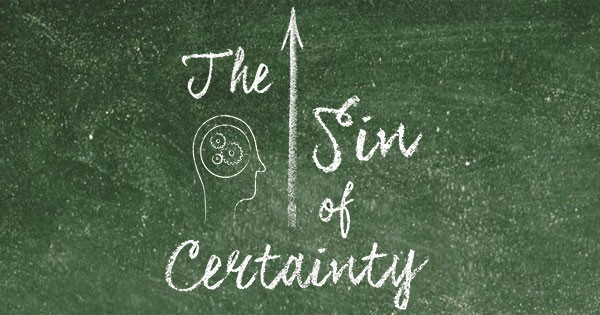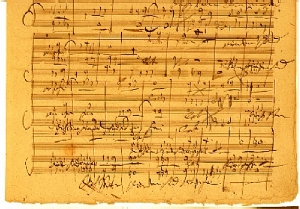The Evolution of Adam: Mid-book Reflections
 This book is really excavating some of my assumptions about Scripture. It lays out in detail the things that don’t really add up — the differences between Genesis 1 and 2, the various similarities between the Genesis creation story and its much older ancient literary “neighbors,” the difference between historical events recounted in Scripture and the archaeological evidence, aspects of the flood story, and more. And it suggests that the Pentateuch is a post-exilic document in which ancient writings were assembled to re-enforce Israel’s national identity, and theological underpinnings, in a time of discouragement and crisis. The book brings me face to face with the fallibility of the human vessels through whom Scripture comes to us. For me, it has raised some uncomfortable questions, foremost of which is, “If these ancient writers embellish and exaggerate about history, why should we believe what they have to say about God?” (More on this below.)
This book is really excavating some of my assumptions about Scripture. It lays out in detail the things that don’t really add up — the differences between Genesis 1 and 2, the various similarities between the Genesis creation story and its much older ancient literary “neighbors,” the difference between historical events recounted in Scripture and the archaeological evidence, aspects of the flood story, and more. And it suggests that the Pentateuch is a post-exilic document in which ancient writings were assembled to re-enforce Israel’s national identity, and theological underpinnings, in a time of discouragement and crisis. The book brings me face to face with the fallibility of the human vessels through whom Scripture comes to us. For me, it has raised some uncomfortable questions, foremost of which is, “If these ancient writers embellish and exaggerate about history, why should we believe what they have to say about God?” (More on this below.)
I am not always comfortable as I read these pages, but overall the experience is going to end up affirming, and breathing new life into, my faith. There is an exhilaration in being encouraged to crack open the door of my closet of unanswered questions — the place where I’ve thrown things I don’t know what to do with as I’ve read the Bible over the years, telling myself, “Someday maybe I’ll understand that.” I may not accept or feel comfortable with everything I’m reading in The Evolution of Adam, and in many ways I have to take the scholarship on faith. But there is always value in cleaning out one’s closet. Sooner or later those heaps have to be attended to, or the sheer weight of them will begin to tilt one’s whole interior world.
I’m reminded of a past experience with “faith.” When I was in fifth grade, I still believed, nominally, in Santa. By then I recognized that he couldn’t come down the chimney, especially in our house that had no fireplace. He clearly bought presents from local department stores rather than employing elf artisans. His handwriting, on the single present signed by him every year, looked an awful lot like my mother’s. True, he ate the cookies we left out for him on Christmas Eve, but in all my 10 years I had never heard reindeer on the roof or seen their tracks anywhere. Yet I liked the idea of Santa, and no one I considered an authority had ever said for sure that he didn’t exist, so I continued to take him as a given — though my “faith” lacked any real vitality.
One day the next door neighbor’s granddaughter and I got into a discussion wherein she informed me that there was no Santa. I’d heard that before. She continued, “It’s okay if you want to believe. My father says that if you don’t believe in Santa, you don’t believe in your parents.”
So I took her inside, where my dad was in the kitchen. “Dad, she says there’s no such thing as Santa. Tell her! She says if you don’t believe in Santa, you don’t believe in your parents. Tell her!”
He said, thoughtfully, “Say that again.”
So that was the end of that. But the reason it comes to mind isn’t that I lost my faith. It’s the quality of my faith just before it toppled — the quality of faith that depends on the suppression, or perhaps more accurately the deferral, of all reasonable questions. It was a dead belief — a ho hum acceptance of an incredible proposition. A mismatch. And it certainly had no impact whatsoever on my daily life; it wasn’t a root from which other parts of life grew. It was more of a pet notion, a cell of willed intellectual assent that amounted to something more like denial of reality.
This is what Christian faith can become if one continually shelves the questions that naturally arise about the Bible. What I’m finding is that considering these questions in the light of what I’m reading in the first half of The Evolution of Adam is exhilarating. It’s making me look more squarely at things I’ve always thought.
- For instance, regarding the inspiration of Scripture, I’ve always known that whatever God is communicating is coming to us through flawed human vessels. They have their agendas and their temperamental quirks and their shortcomings.
- I’ve always known that the creation accounts are not eyewitness accounts. What difference does it really make whether they were written before or after the Babylonian exile, or whether by Moses or another writer?
- It’s always been an incredible assertion that the God of the universe would condescend to the level of human culture, allowing himself to be cast in the terms we’re able to come up with in his eagerness for relationship. He does it no less now than he did with the ancient writers who shaped Genesis. Perhaps he had been sending his call out through creation for ages before Abraham heard him with enough clarity to enter on a course of personal revelation that became an entry for the divine into human experience. (I think of Akenaten, too — the Egyptian pharoah who, in the midst of Egypt’s wildly polytheistic culture, became convinced that there was only one God. Did he, too, perceive the Creator at some level? But in his case it gained no traction; Egypt struck him from the records and reinstituted their old practices when he died.)
The question that naturally arises when we take a hard look at the human side of the Bible’s writing is the one I asked above: why believe any of it? If it’s true that the routing of the Canaananites, or the exodus, or other events, are exaggerated by later writers who want to reassure themselves that they have a special relationship with God, aren’t these writers discredited? What I’m reminded of again and again as I read this book is the uniqueness of Christian theology — the absolute singularity of the character of the ancient Jewish God, his style of creation, and his dealings with humanity. Setting his personality against the backdrop of other ancient writings and cultures only shows this up more sharply. Sure, it’s possible that he could be a human invention, but that doesn’t seem very likely.
Being brought face to face with the human role in assembling and writing Scripture, I have to ask myself: does any of this strike materially at what I’ve always believed? It really doesn’t. And what I’m most captivated by is the recognition that it’s God who inspired Scripture, speaking into human hearts — then, and now. For Christians, ours is not a faith only in the written word, but in the God who inspires it, as much in the present tense as in the ancient written text. He spoke, and still speaks; the fact that he could use the ancient writers of Scripture is a deeply encouraging reminder that he can use the flawed writers and thinkers of today.
This is a book about the integrity of the Bible through eras of developing knowledge — scientific, literary, archaeological. Some of what it says unsettles me, but I’m so glad to be reading it. I’ll be posting on it again when I finish it.



One Comment
Amy @ Hope Is the Word
Very interesting, Janet. Thanks for sharing your thoughts. I really identify with the whole “cleaning out the closet” and “tilting one’s interior world” metaphor. It is good to ask the hard questions! I look forward to your further thoughts.